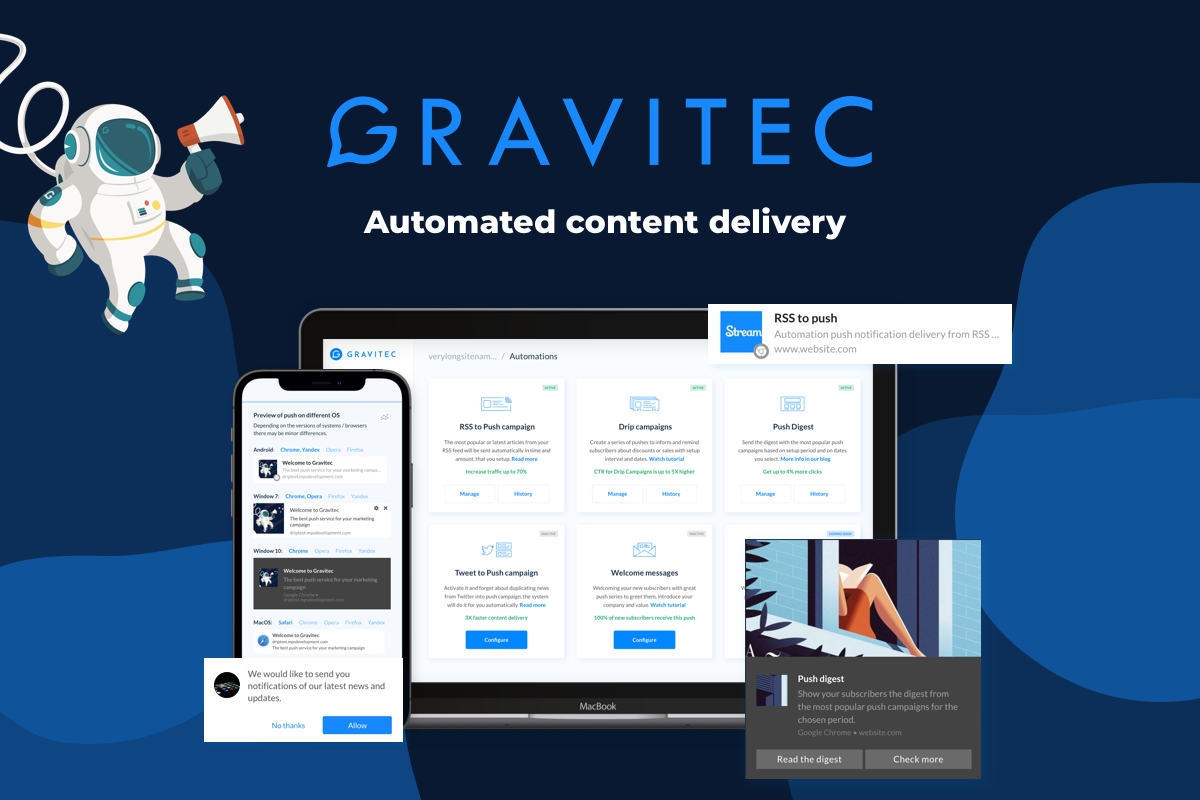Is there any reason to launch a new media company? In the era of Facebook, would it be profitable?
In this article, we’ll discover the differences between e-commerce and media business. What does it take to start a media company and make money?
What is a Media Company?
If you create content with professional editors and writers, publish it periodically, it means that you are in the media business. Owners of newspapers and magazines establish media companies. They produce content, bundle it, and distribute it. Sometimes, they produce it in both paper and digital formats.
TIP
 However, the media industry contains film and music production, graphics, art, etc. (any type of media content). And so, social media are a part of this industry as well. These digital communities are platforms for sharing user-generated content. Today, they compete with publishers for people’s attention.
However, the media industry contains film and music production, graphics, art, etc. (any type of media content). And so, social media are a part of this industry as well. These digital communities are platforms for sharing user-generated content. Today, they compete with publishers for people’s attention.
What Does a Media Company Do?
Let’s focus on the activities of publishers as an example of a media company. Publishers provide readers with different info: breaking news, investigations, reviews, etc. Some media cover many topics – politics, business, economics, health, etc. Others specialize in one specific niche for their publications.
Besides print, publishers also put their content online. With websites, they have more opportunities to engage visitors. Besides text and photos, media companies create audio and video content. They can use platforms such as YouTube to interact with their audience in additional ways.
What are the Differences Between e-Commerce and Online Media Companies?
 Every company today has to increase its influence by creating media content. The main differences between an e-commerce company and an online media company are:
Every company today has to increase its influence by creating media content. The main differences between an e-commerce company and an online media company are:
- the size of the target market
- the method of interacting with website visitors
- what drives profits
An e-commerce website and a media company approach building a sales funnel differently. A commercial one offers products to visitors in hopes of making a sale. The main “product” of online media is content. Content and readers create value for publishers. The more traffic a media website attracts the higher its ratings. Popular media companies have more opportunities to work with advertisers than lesser-known ones. Thus, they have more potential revenue streams.
Learn more about recurring revenue models.
Steps to start your media company
Now, we’ll find out the steps of starting a media company and how to promote it. If you want to start up an independent media company with your own content, follow our tips below.
Target audience
The first step is similar for any company. You need to target a particular group of readers. This will provide you with ideas for content, and give you direction on building a website. Depending on the number of potential readers, you can determine the size of your business.
As an example, suppose you want to establish a blog about sports. Define your target group (or groups) – age, gender, region, etc. Connect the segments with particular sports (i.e. football, basketball, swimming, etc.). Now you can plan the limits of traffic for your website, the development stages of your business, and the marketing channels to interact with users. You know your audience’s interests, and what they need and buy. Based on this info, you can immediately build revenue streams by working with advertisers.
Read if it’s worth trying blogging as a hobby.
Benefits and value
Like an e-commerce company, you need to identify the valuable features of your media company. They will form your company image and a core message for readers. What differentiates you from your competitors? Stay unique. What new info will users find on your website? Make it clear for readers. Show the benefits they’ll get from your company.
Print or digital?
 Substantial operating costs for a print publication are not appealing to a startup. However, you can easily start an online media company by just installing WordPress.
Substantial operating costs for a print publication are not appealing to a startup. However, you can easily start an online media company by just installing WordPress.
TIP
Even some well-known newspapers have discontinued printing to cut expenses. Also, some leading print media publish articles on their website before putting them in print.
Advantages of digital media:
- It is easy to make changes to articles, even after publishing
- Interactivity
- Ability to collect subscriber data
- 24/7 access from any region
- Ability to respond quickly to subscriber requests
Learn how to notify subscribers about your new posts on WordPress.
Create content and attract users
Define categories and topics for creating content. Base your choice on the popularity of topics, search requests, trends, and/or keywords. Create high-quality, unique, and useful content for your audience. Depending on your niche (news, stories, blog articles), plan a marketing strategy to attract new visitors, and interact with loyal customers.
For website promotion, you can use:
- Search engine optimization
- Paid ads
- Guest blogging
- Social media marketing
- Partnering with other media
Read more about unorthodox ways to attract visitors to your website.
Best tools to encourage visitors to return to your website after they once visit it:
- Push notifications. Best providers for media – Gravitec, Izooto
Try Push Notifications WordPress Plugin
- Email marketing. Providers – MailChimp, Sendinblue, Aweber
Using these tools you’ll create a subscriber base to communicate with loyal readers.
Make a profit
What are your goals for starting a new media company? The most popular reason is to generate income. Ads are not the only source of revenue for media companies. What are the alternative sources of revenue for publishers?
We’ve collected some ideas for you on how to make money with an online media company.
- Google AdSense. With this service, you insert a programming code on your website to display ads. The amount of your revenue depends on your website traffic. Cost Per Click (CPC) differs for various industries. Generally, the rate ranges from a few cents to $1-2 per click. On average, the number of clicks on ads is less than 1% of website traffic. Calculate your approximate revenue using your website statistics (“Pageviews Per Month” in Google Analytics).
- Third-party ad platforms. Much like Google Ads, third-party platforms connect advertisers with website owners. However, you get more potential for revenues. For example, ZEDO provides publishers with rich ad formats and videos to display on their websites. The company has tools for targeting and reporting. You can even find ad servers with ready-made promotional text content.
- Crowdfunding. If you’ve collected a loyal base of subscribers, ask them to help expand your business. Definitely, it’ll work if your company is highly trusted. For instance, perhaps you write about economics but want to hire someone to start a politics column. Crowdfunding can help you raise a basic amount of money for further investment.
- Paid content. Offer your subscribers access to especially valuable content for a fee. Membership is rather popular among online media. You can use paywall tools to gate your paid content. To encourage visitors to participate, offer bonuses with a purchase (calls to editors, consultation).
- YouTube Channel. Create video versions of your content, so that it can be posted on Youtube. Monetize your YouTube channel with ads.
- Partner program. Many companies have affiliate programs for the sales of their products through their partner network. To take part in it and make money, you need to publish stories about products on your website and include an affiliate link. Members of these programs receive commissions when purchases are made through their referral links. If you post affiliate links on social media, we recommend you customize their preview to get more clicks using the Piar.io app.
Another option for a company that already has an influence in its industry is to find a sponsor. Sponsors provide revenue for the media company and become their partners.
As stated above, once you attract an audience, and keep them engaged, your online media company will have more opportunities to generate revenue.
Tools for the Job
Let’s look at some tools for successfully starting and developing a media project.
CMS (i.e. WordPress, HubSpot CMS). Build a media website. Use their free templates, or create a customized website structure of your own.
Social media: Facebook, Twitter, Instagram. Reach your target audience with all sorts of social platforms you can. Redirect users from social media to your website to generate traffic.
Video: YouTube, Vimeo. Use YouTube for hosting and monetizing your video content. Use Vimeo for live streaming, or publishing videos with no ads.
Photos: Imgur, Flickr, ImageShack. Store your photos externally to conserve disk space on your server.
Email: Aweber, Brevo, HubSpot, MailChimp. Email marketing systems will help you to interact with subscribers personally, inform them about offers, and track their responses.
Push notifications: Gravitec.net. Push platforms are a great way to generate return traffic to your website. Automation tools make it easy to notify subscribers about breaking news, new posts, etc.
Try Push Notifications for Free
Summary
To establish an independent, reputable media company, one that generates revenue, you have to:
- Define your target audience and niche.
- Create valuable unique content.
- Determine your core message and the benefits to readers.
- Attract visitors with SEO, SMM, guest blogging, partner with other online media.
- Interact with your audience using email marketing, push notifications, social media.
- Create audio/video versions of your content, and post them on other platforms, in order to reach a wider audience.
- Monetize your website and YouTube channel by displaying Google ads.
- Connect to third-party ad platforms (as an extra option).
- Expand your business with crowdfunding.
- Unlock specific sections of your website to paying members.
- Promote/sell products through affiliate programs, and generate commission revenue for your company.
- Look for companies interested in your content for sponsorship.
TIP
What is the first step in starting a media company?
The first step is to define your target audience and niche. This helps you identify what content to create, plan your website structure, and determine marketing channels to attract and engage readers effectively.
How can I monetize my online media company?
You can monetize through Google AdSense, third-party ad platforms, paid memberships, affiliate programs, YouTube ad revenue, and sponsorships. Offering exclusive paid content or crowdfunding are additional revenue streams.
What tools are essential for starting a media company?
Use CMS platforms like WordPress to build your website, social media for traffic, email marketing tools like MailChimp for subscriber engagement, and push notification services like Gravitec.net to drive return visits.






